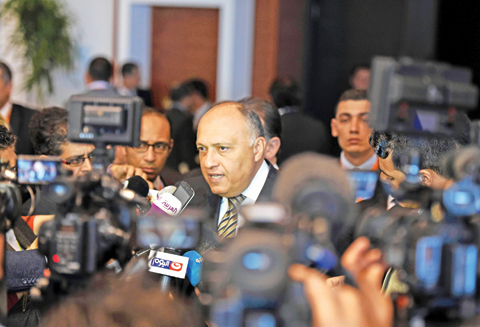PARIS: French prosecutors have opened an investigation into a “terrorist plot” after a man known to the authorities as a radical Islamist with mental health troubles stabbed a tourist to death and wounded two other people in central Paris at the weekend before being arrested.
The attack close to the Eiffel Tower occurred at around 9:00 pm (2000 GMT) on Saturday during a busy weekend, at a time when France is on its highest alert against the background of the war between the Zionist entity and Hamas. Prosecutors specializing in terrorist incidents told AFP on Sunday they had launched a probe into the attacker, identified as Armand Rajabpour-Miyandoab, a French national born in 1997 to Iranian parents who was arrested soon after the knife and hammer attack.
He is suspected of murder and attempted murder “in connection with a terrorist plot”. A 23-year-old man, identified by a judicial source as a German-Filipino citizen, died in the attack. A 66-year-old British citizen and a 60-year-old French national were wounded. Rajabpour-Miyandoab, who is known to authorities for extremism, shouted “Allahu Akbar” — Arabic for “God is greatest” — at the moment of the attack, Interior Minister Gerald Darmanin said at the scene by Bir Hakeim bridge over the River Seine.
The suspect, who lived with his parents in the Essonne region south of Paris, told police he could not stand Muslims being killed in “Afghanistan and Palestine” and accused France of being “an accomplice to what the Zionist entity is doing” in the Gaza Strip, Darmanin added. “We will not give in to terrorism,” Prime Minister Elisabeth Borne wrote on X, formerly Twitter, after the attack. President Emmanuel Macron said he was sending his condolences to the family of the man killed in the “terrorist attack”.
‘Unstable and easily influenced’
Police and security sources confirmed the attacker had posted a video on social media at the moment of the attack, claiming responsibility and speaking about “current events, the government (and) the murder of innocent Muslims”.
Investigators would scrutinize his medical history, a security source told AFP, saying the attacker was “very unstable and easily influenced”. The attacker was “being monitored in way that did not mean he was being hospitalized, he was supposed to follow a course of treatment” for his mental health issues, Health Minister Aurelien Rousseau told broadcaster France 3.
“As often in these cases, there’s a mixture of an ideology, an easily influenced person and, unfortunately, psychiatry,” Rousseau added. Darmanin said the man had previously been sentenced in 2016 to four years in prison for planning another attack in the Paris business district of La Defense, which he failed to carry out.
A taxi driver who witnessed the scene intervened, Darmanin added, saving the wife of the slain tourist. Patrick Pelloux, an emergency doctor who was on duty at the time of the attack, said the couple were both nurses, adding that the woman was severely shocked but unhurt.
The attacker then crossed the bridge, lashing out at others and injuring one with a hammer. Pursuing police used a taser to neutralize the man, who was then arrested. Rousseau told France 3 on Sunday that the wounded victims were “in good health”, suffering only “superficial traumas, but of course psychological traumas that will be enormous”.
Joseph S., a 37-year-old supermarket manager who asked not to give his last name, witnessed the scene as he sat in a bar. He heard screams and people shouting “help, help” as they ran. A man wielding a hammer attacked a man who had fallen down, and within five to 10 minutes the police arrived, he told AFP. The country has suffered several attacks by Islamist extremists, including the November 2015 suicide and gun attacks in Paris claimed by the Islamic State group in which 130 people were killed. There had been a relative lull in recent years, even as officials have warned that the threat remains. — AFP
But tensions have risen in France, home to large Jewish and Muslim populations, following Hamas’s attack on the Zionist entity on October 7 and the Zionist entity’s bombardment of the Gaza Strip. Security in Paris is also under particular scrutiny as it gears up to host the 2024 Summer Olympic Games. In October, teacher Dominique Bernard was killed in the northern French town of Arras by a young radicalized Islamist from Russia’s Caucasus region. — AFP










